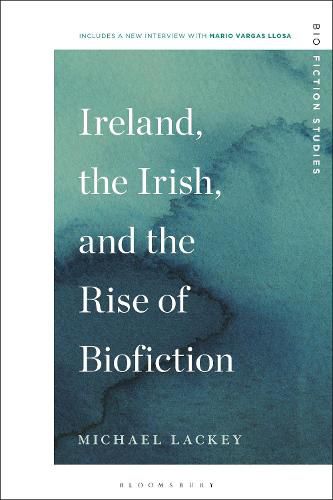Readings Newsletter
Become a Readings Member to make your shopping experience even easier.
Sign in or sign up for free!
You’re not far away from qualifying for FREE standard shipping within Australia
You’ve qualified for FREE standard shipping within Australia
The cart is loading…






Biofiction is literature that names its protagonist after an actual historical figure, and it has become a dominant literary form over the last 35 years. What has not yet been scholarly acknowledged or documented is that the Irish played a crucial role in the origins, evolution, rise, and now dominance of biofiction.
Michael Lackey first examines the groundbreaking biofictions that Oscar Wilde and George Moore authored in the late 19th and early 20th centuries as well as the best biographical novels about Wilde (by Peter Ackroyd and Colm Toibin). He then focuses on contemporary authors of biofiction (Sabina Murray, Graham Shelby, Anne Enright, and Mario Vargas Llosa, who Lackey has interviewed for this work) who use the lives of prominent Irish figures (Roger Casement and Eliza Lynch) to explore the challenges of seizing and securing a life-promoting form of agency within a colonial and patriarchal context.
In conclusion, Lackey briefly analyzes biographical novels by Peter Carey and Mary Morrissy to illustrate why agency is of central importance for the Irish, and why that focus mandated the rise of the biographical novel, a literary form that mirrors the constructed Irish interior.
$9.00 standard shipping within Australia
FREE standard shipping within Australia for orders over $100.00
Express & International shipping calculated at checkout
Biofiction is literature that names its protagonist after an actual historical figure, and it has become a dominant literary form over the last 35 years. What has not yet been scholarly acknowledged or documented is that the Irish played a crucial role in the origins, evolution, rise, and now dominance of biofiction.
Michael Lackey first examines the groundbreaking biofictions that Oscar Wilde and George Moore authored in the late 19th and early 20th centuries as well as the best biographical novels about Wilde (by Peter Ackroyd and Colm Toibin). He then focuses on contemporary authors of biofiction (Sabina Murray, Graham Shelby, Anne Enright, and Mario Vargas Llosa, who Lackey has interviewed for this work) who use the lives of prominent Irish figures (Roger Casement and Eliza Lynch) to explore the challenges of seizing and securing a life-promoting form of agency within a colonial and patriarchal context.
In conclusion, Lackey briefly analyzes biographical novels by Peter Carey and Mary Morrissy to illustrate why agency is of central importance for the Irish, and why that focus mandated the rise of the biographical novel, a literary form that mirrors the constructed Irish interior.